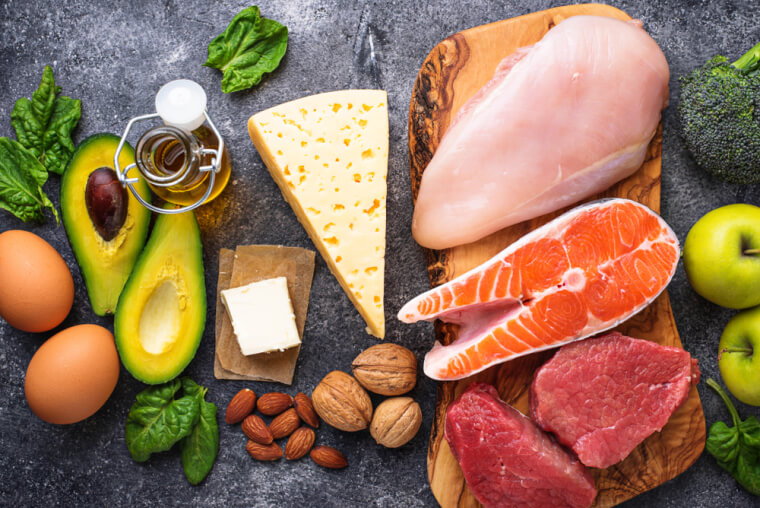1. The Atkins Diet
One of the most well-known low-carb weight-loss approaches, the Atkins diet is clear and simple: you can eat as many proteins and fats as you like, but you must avoid carbohydrates. The reason this method has worked wonders for so many people in their weight-loss journey is that dropping carbs eventually reduces appetite overall, which in turn leads to fewer calories being consumed. A major benefit of the Atkins diet is that it helps reduce stubborn belly fat since carbohydrates are often to blame for the build-up in the abdominal cavity. There aren't any obvious downsides to this diet, but like any nutritional plan make sure the proteins and fats you're consuming are of the highest possible quality.
2. The Vegan Diet
The vegan diet has never been more popular than it is today. In fact, 'veganism' as a movement has taken off globally over the past few years and embodies the active resistance to animal cruelty and harm to the environment. The diet itself is extremely restrictive, with all animal products off the menu for ethical, environmental, or health reasons. Essentially the strictest form of vegetarianism, going vegan (or 'plant-based') means eliminating meat, dairy, eggs, and even animal-derived products like honey, casein, and whey. Is it effective for weight loss? Well, the vegan diet is so restrictive that it's almost guaranteed to help you shed the pounds, and the combination of low fat and high fiber intake assists in this. The concern surrounding a plant-based diet is its inability to provide essential nutrients we'd typically get from eating meat. Vitamins B12 and D, iron, iodine, calcium, zinc, and omega-3 fatty acids are all in short supply.
3. The Paleo Diet
The Paleo Diet, also known as 'the caveman diet' claims that we should be following the nutritional habits of our hunter-gatherer ancestors. Paleo was developed out of the belief that most modern diseases are a direct result of today's Western diet and its reliance on processed foods, grains, and dairy. Whether the paleo diet truly replicates what our ancestors ate is up for debate, but the concept is sound nonetheless. In its strictest form, the diet emphasizes lean protein, nuts, seeds, wholes foods, fruits, and vegetables, whilst strongly discouraging processed foods, sugar, and dairy. A number of studies have shown a link between the paleo diet and significant weight-loss, and it also appears to be effective at reducing the risk of heart disease.
4. The Zone Diet
The Zone Diet is fairly technical and places a limit on carbs - that must have a low glycemic index (GI) - to 35-40%, protein to 30%, and fats to 30% of your daily calorie intake. The GI of a food is the estimated rate at which it raises your blood sugar levels after consumption, and the diet was initially designed to combat inflammation, reduce the risk of infectious diseases, and help lose weight. Studies of the Zone Diet aren't entirely convincing when it comes to weight-loss, but its general health benefits, especially as an antidote to heart disease, make it a worthwhile endeavor.
5. The Ultra-Low-Fat Diet
Not one for dairy lovers, the ultra-low-fat diet restricts the consumption of fats to just 10% of overall daily calorie intake. This is extreme, given that regular low-fat diets limit that consumption to around 30%. The reason for this extra 20% trimming is that proponents of the ultra-low-fat diet claim that 30% is still too much to ultimately be effective. At just 10% fat intake, dieters are looking at predominately plant-based options and the menu is generally very high in carbohydrates. While the ultra-low-fat diet has shown to be successful among obese individuals over short stints, the longevity of the diet is a contentious issue. The fat restriction may inadvertently lead to long-term problems, as it's an essential nutrient for the body, and the likelihood of being able to stick to what is a somewhat bland plan is incredibly slim.
6. Intermittent Fasting
Unlike the rest of the diets on this list, intermittent fasting is all about controlling when you eat, rather than what you eat, placing your body through a consistent cycle of eating and fasting. There are a number of popular ways to approach this method, such as the 16/8 - skipping breakfast and only eating for the 8 hours that follow your broken fast, or the 5:2 - restricting your food consumption to around 500 calories on 2 non-consecutive days of the week. Either way, research shows that intermittent fasting can be a very effective weight-loss strategy, with those tested losing 3-8% body fat over a period of 3-24 weeks. However, if you're pregnant, nutrient-deficient, or sensitive to drops in blood sugar levels, intermittent fasting is not advised.






